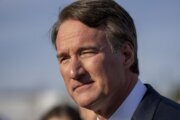JOHN-THOR DAHLBURG
Associated Press
BRUSSELS (AP) — These days, more Europeans than ever are skeptical or hostile toward efforts to unite the continent into an economic and political superpower. In that volatile mood, voters in 28 countries on Thursday begin choosing the next European Parliament and helping determine the EU’s future leaders and course.
A prominent Dutch Euroskeptic, Geert Wilders, predicts the results will produce a political “earthquake.”
From Scandinavia to the Mediterranean, support has never been shakier for allowing the European Union and its institutions a major say over people’s lives. Founded in the aftermath of World War II with the goal of fostering prosperity and peace, the EU is now blamed by many for tough economic times, bureaucratic overreach and doing the bidding of the rich and powerful.
“The cake should be shared out better,” Portuguese fisherman Fernando Ferreira, 50, said after docking his wooden-hauled trawler at a Lisbon wharf. “They should come and speak to us small people, and find out what things are really like.”
Around 400 million Europeans are eligible to take part in what is termed the world’s largest cross-border exercise in representative democracy. By the time the final ballots are cast and counted Sunday, they are expected to show a surge in support for parties on the left and right fringes that aim to prune back the EU’s powers, reform the trade bloc — or abolish it altogether.
“The reputation of the European Union has been one of the many casualties of the economic crisis,” said Maurice Fraser, head of the European Institute at the London School of Economics and Political Science. ” Many on the left have traditionally depicted it as a tool of global capitalism and now treat it as a convenient scapegoat for the belt-tightening which all EU governments are having to undertake.”
As for many conservative voters and the governments of some member states, Fraser said, they see the EU’s insistence on breaking down barriers as a threat to social cohesion.
One opinion survey released this month found only 52 percent of those surveyed in seven European countries had a favorable opinion of the EU, and most complaining it doesn’t understand their needs and is intrusive and inefficient.
In the election, voter turnout — 43 percent the last time in 2009 — should slump even lower though the European Parliament has gained more powers. For many Europeans, the multinational legislature that divides its time between Brussels and Strasbourg in France remains remote and mysterious.
“The next time I meet my MEP (member of the European Parliament), it will be the first time,” said Jim Caldwell, 42, a Dublin street sweeper.
In the Czech Republic, an April poll showed 80 percent of those surveyed didn’t care about the election, and only about a third intended to vote.
But while Czech voters may be indifferent, their politicians are not. There are 852 candidates vying for the country’s 21 seats. They come from 38 rival parties and groups, including a pro-monarchist movement, a party that accuses the Roma minority of sponging off the system, a movement supporting volunteer firefighters and “No to Brussels — National Democracy — an ultra-conservative nationalist grouping that is against the EU, as well as homosexuals and Jews.
EU-wide, 16,380 candidates from 953 different parties or lists are vying for one of the 751 seats to be filled. In Sweden, appalled by attempts to restrict abortions in Spain, the Feminist Initiative party is attempting to become the first fully-fledged feminist party represented in the European Parliament.
To try to drum up citizen enthusiasm, the multinational legislature’s TV promos and advertisements have been telling Europeans, “this time it’s different.”
It is true that for the first time, votes cast by EU citizens from Thursday to Sunday are supposed to be a factor in selecting the president of the European Commission, the trade bloc’s executive arm. But the candidates openly running for the post, including former prime ministers of Luxembourg and Belgium and the European Parliament’s outgoing president, have failed to generate much grassroots excitement.
“There’s no one out there who inspires me to vote,” said Stefanos Eleftheriou, 28, a university graduate in Cyprus who has been hunting for two years for a job in publishing. He said young people are fed up by what they perceive as a leadership vacuum and politicians who merely repeat slogans.
“We’re seeing the same things being constantly recycled — that’s what we’re turning our back on,” he said.
Others Europeans express support for the ideal of ongoing continental integration, but are hoping for a course change.
Now that the EU has tackled the financial crisis of Eurozone member states like Greece and Ireland and the problem of how to regulate banks, “from the viewpoint of the people, there is a real urgency to create new jobs and solve the European social crisis,” Finland’s largest newspaper, Helsingin Sanomat, said in an analysis.
Peter Sznur, 67, a retiree who lives with his wife in the Berlin neighborhood of Wilmersdorf, wants the EU to start focusing more on people’s genuine needs and stop paying mere lip service to the ideal of one Europe.
“For example, why should Germany take down all of its nuclear power plants if next door in neighboring counties they build as many nuclear power plants as they can?” Sznur said. “That’s so senseless — if there’s a meltdown in Poland it’s going to affect us just as much as if it happened in our own country.”
An independent Brussels-based organization, VoteWatch Europe, has crunched opinion polls from across the EU, and is predicting parties of all kinds that oppose the European Union in its current form will net up to 30 percent of the overall vote (up from less than 20 percent in 2009), meaning a boost in parliamentary seats from 100 to 180.
Would that be enough to alter the EU’s direction? Janis Emmanouilidis, director of studies at the European Policy Center, a Brussels think tank, is dubious.
“Even if they do better than in 2009, how much will they actually influence policymaking?” he said. “I think that in the European Parliament, their role will not be that strong because they are so disparate. I think it will be a problem for them to come together.”
Wilders, founder and leader of the Party for Freedom in the Netherlands, is forecasting a game changer, and not just in the EU, but in the national politics of the countries that belong to it as well.
“What we have in common is that we want to have less transfer — even the repatriation — of sovereign rights to our national capitals instead of the Eurozone,” Wilders said of the parties that oppose the European Union as it now is. “Anything that wants to have more power, spend more money on countries like Greece or other countries or have more countries joining the Eurozone — that we would wish to stop.”
____
Associated Press writers across Europe contributed to this report.
Copyright 2014 The Associated Press. All rights reserved. This material may not be published, broadcast, rewritten or redistributed.







